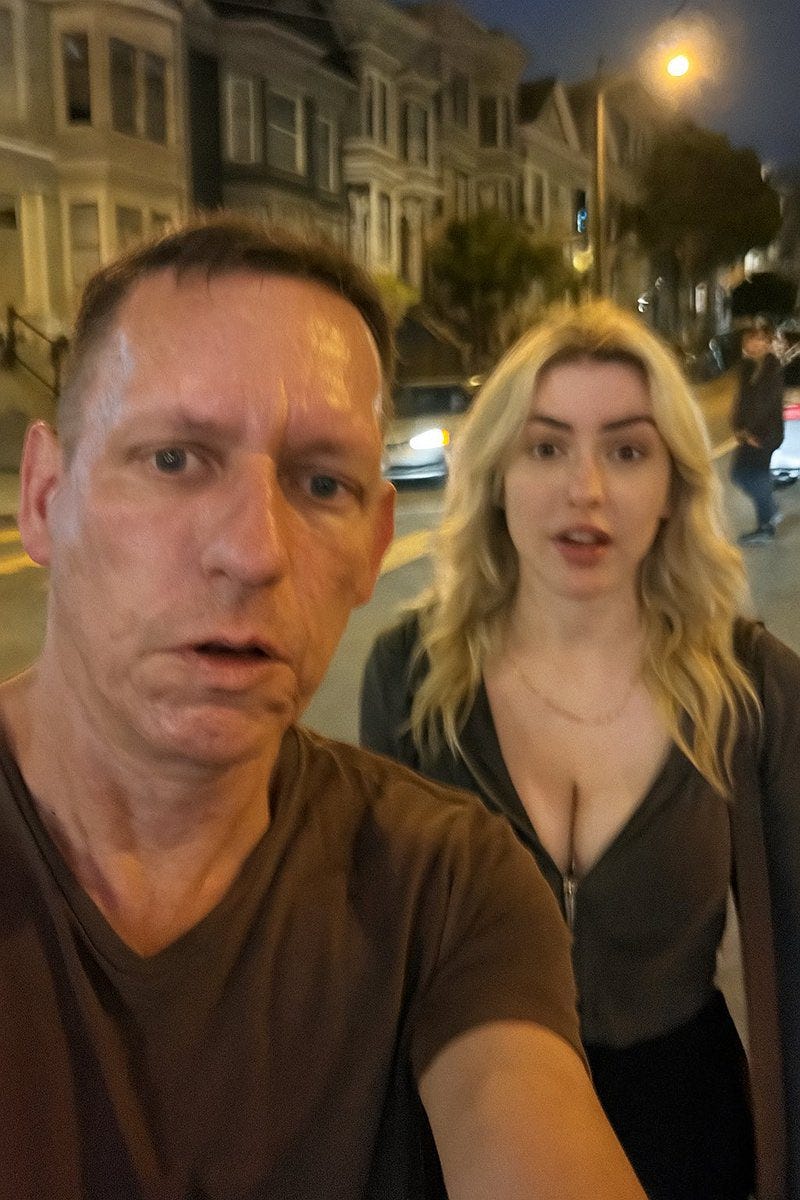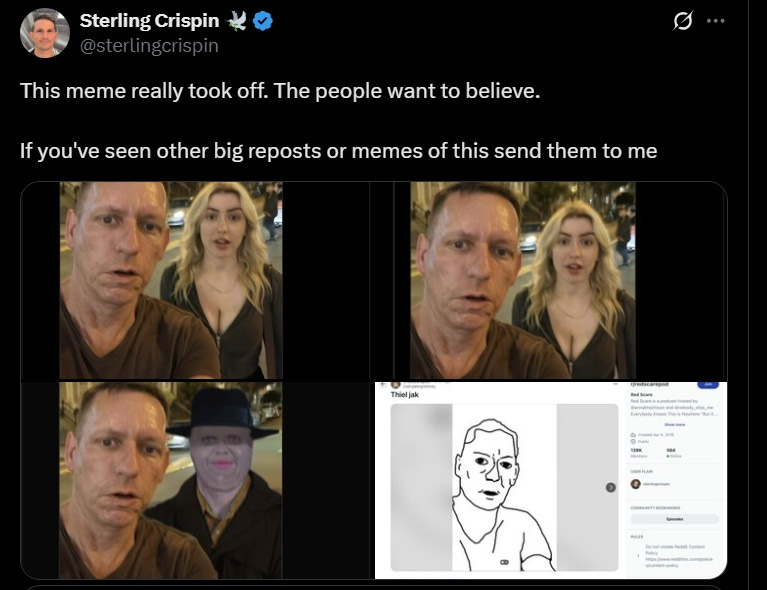DO YOU WANT LIFE TO CONTINUE? PETER THIEL, THE ANTICHRIST AND ONLINE 'HEAT'
Thiel is an easy dunk. Nobody wants life to continue at any price.
THIEL’S HESITATION (DO YOU WANT LIFE TO CONTINUE)
Do you want life to continue? Caught out by a version of this question in his NYT chat with Ross Douthat, Peter Thiel was dunked on far and wide across the internet. ‘Antichrist’ indeed, how can you not want life to continue? But Thiel’s hesitation verges on the fascinating. Douthat’s gotcha (‘I think you would prefer the human race to endure, right?’) and the pause don’t necessarily mean what they seem to mean. The unconscious basically doesn’t want human life to endure, so in some ways the pause is the right answer. ‘Save life’ cannot be a demand, even if it has to be. Nobody wants life to survive at any price. And that has to be heard several ways.
That the unconscious does hesitate when faced with that question on a daily basis is all too self-evident and all too problematic. One can say that the unconscious is nothing but this sustained pause. Daily life is the very human but hardly humane ‘long hesitation’ that systematically fails to do what it would really take to ensure that humanity endures. Douthat is at least asking the right question of the right person here but the fantasy is that it is never me that doesn’t want life to continue (it’s you) and so we might hesitate before putting Thiel down as the only criminal getting in our way.
A few days after this moment of hesitation, X user @sterlingcrispin posted an AI-generated image showing Thiel posing with the Rizz ‘em with the ‘tism girl Rachael Lerman. The image—although it immediately follows it on the timeline—at first glance has nothing to do with Thiel’s moment hesitation. Dean Kissick writes:
Memes have changed. Maybe they’re not even memes anymore, just image edits—no joke, no meaning, no information, signifiers pointing nowhere, all that remains is a condensation of a specific moment. Two folkloric characters (the Antichrist and the Sorcerer) cast adrift.
This may be a true reading of the Thiel-Lerman AI-image in some late cultural internet studies type of way but the image is also obviously overwritten by the various meanings and nonmeanings of Thiel’s hesitation just before. Kissick already co-opts the received position, which is that it is Thiel and not Greta (as per Thiel’s fantasy) who is the antichrist, and the rest of us who naturally want life to continue. They are the Devil, we are not.
Not so fast, then—and ‘not so fast’ because of the already implied unconscious. If we could answer that question smoothly, without any instinctual drag, many things would be well and have to be well. They are not.
ONLINE HEAT/‘HEAT DOMES’
Many noticed that Thiel seems to be melting in that photo. As anyone would—presumably with the sin of it—who really wishes to end all life. In fact around this time everyone seemed to be talking about heat of a specific kind. Here is Dylan Saba for example at the end of his recent Iran think-piece, ‘Wave Of Domination’:
In our state of open contingency, one thing feels certain: the temperature’s rising. Let’s hope we can stand the heat.
Or, say, Christina Grasso writing about ‘Olsen-esque, pre-Raphaelite hair’:
Well, the heat wave is no longer just looming as it has arrived like a bat out of hell—and now I understand why so many Renaissance women were pictured lying topless on a fainting couch, because same.
But which heat, and which heat is which? And how is possible that topical interventions like Saba’s vanish so quickly? Is it really the case that we forget what happens as it happens? Well, sure it is, and we should be able to say so by now without too much sweat. But why this melted Thiel Jak of the unconscious?
Let’s do some theory for a second to understand the greasy ontological thielbux heat dome of the supposedly contemporary timeline. Baudrillard touches on the general problem of temperature and forgetting at the beginning of the ‘Holocaust’ chapter of Simulacra and Simulation, writing, in a phrase that occurs as a fragment in Godard’s Histoire(s) du cinéma:
Forgetting extermination is part of extermination, because it is also the extermination of memory, of history, of the social, etc.
This ‘Holocaust’ chapter—which is about the American TV miniseries Holocaust (1978)—runs this argument about the-immanence-of forgetting-to-extermination through a ferocious critical delimitation of the power of images, those of the television of the time but also of cinema.
Baudrillard claims perhaps somewhat provocatively that the ‘artificial memory’ of expanding image-based culture works as a medium that is itself cold, radiating forgetfulness, deterrence and extermination, in ‘a still more systematic way, if that is possible, than the camps themselves’. (In terms of Kissick’s commentary, it would be here that we locate imaginal cut-adriftness.)
He adds that Holocaust (1978) ‘is an attempt to reheat a cold historical event—tragic but cold, the first great event of cold systems, those cooling systems of dissuasion and extermination which were subsequently deployed in other forms’.
Baudrillard did not live to extend the cinema-television through-line to the internet, but the implication is self-evident. Everything said here in the name of ‘holocaust’ in and as television may also be said of the nuclear event of the Internet, and the heat of its ‘images’, memes or post-memes, on ‘the timeline’:
One no longer makes the Jews pass through the crematorium or the gas chamber, but through the sound track and image track, through the universal screen and the microprocessor. Forgetting, annihilation, finally achieves its aesthetic dimension in this way—it is achieved in retro, finally elevated here to a mass level.
Being online is itself the phenomenology of forgetting extermination, or of the ‘same black hole as Auschwitz’. And since being online is now an essentially American-centric experience, one notes here the specifically American and heated tone of contemporary forgetting. The ‘timeline’ is itself irresistible, as intractable and delicious as hate. It alone is enough to make one melt. Do we really want life to continue?
DEUX EX ARABIA
The lack of ‘aura’ for a black ooze which generates ‘light’ melts back from alphabetized screens into a pre-mimetic zone.—Tom Cohen, Ecocide and Extinction, Volume 1
Perhaps the internet must be imagined as just this long slow but perhaps increasingly sudden and mind-killing nuclear flare that melts any and all faces ongoingly, a helter-skelter-welter without shelter as intense and fatal as any obliviating solar rendition will ever be, a controlled freeze-framing of an epochal crashing in and out. One can feel this heat but it hardly locates itself solely in one new melt-back (a key term in Ecocide and Inscription)—unless you are there. And generally speaking we are not there.
In place of the western image depots and hothouses there have been of late brief moments of a deus ex Arabia heating up—the strangely obscene surge of Iranian war-core videos on the timeline already waned; sheer momentary heat from elsewhere. That these were brief appearances does not mean that the implicit cold heat of the digital image—the internet itself as a face-blistering nuclear event—does not now spread. It does so out of sight. A private enclosure but one that relentlessly as if proves entropy against all life. Do you really want life to continue, or just this heated screen migration?
DOOM INSCRIPTION SCROLL DOME
There’s also what Avital Ronell does in lectures with Heidegger’s line:
Even this doom of the god remaining absent is a way in which world worlds.
‘Worlding’ (das Welten) carries ‘welt’ (the sweltering heat), and translates for her as:
Even the doom of the absence of the God is a way in which the world worlds and blisters us.
The world doesn’t world, it blisters. From now on, the world only blisters.
Celan:
A little doom, as big
as the heartdot I set
behind your my name
stammering eye,
is helpful to me.Sweltering, stammering, blistering, ‘heat domes’, deleted-melted objects, all turning on a melted-back dime. Virtually doomed segments of Los Angeles earlier this year; Altadena, where Gary Indiana lost his library. Or thinking of the near loss of Holocaust paintings confided to me. Everything to come is in this nearness. The virtual very material and ongoing apocalypse is the thing itself. There is no event of the real end of the world, just melt. Internet image culture as near-irreversible nuclear chain reaction. Thiel melts under the unconscious stellar glare. It’s getting pretty hot now, we might not make it. The Gazafication of the climate change unconscious. Heat.







